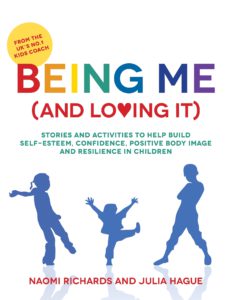We talked to Julia Hague about why her new book Being Me (and Loving It) is such a valuable resource for building self-esteem in kids. She discusses the common self-esteem and body image issues affecting children today, and provides advice on how to support them. Co-written by Naomi Richards (the UK’s number 1 kids coach), Being Me (and Loving It) includes 29 activity-based lesson plans designed for teachers, youth workers, educators and parents supporting children aged 5-11.
- Tell us a about your writing process. Why did you decide to write Being Me (and Loving It)?
My writing focusses on giving a voice to the real life situations in which children find themselves, and being able to invoke in the child reader a feeling of “that young person’s just like me”. When a child sees a person in a story just like them, and sees that person work through a predicament, it gives them the confidence to feel that they too can work things out.
- How important is it to build a healthy self-esteem and body image in children? What long-term effect can low self-esteem have from an early age?
Feeling confident about yourself, not bowing to outside pressure to become someone different to who you are, cascades down into every area of your life and can make a huge difference to children when they approach puberty and beyond. Children who feel good about themselves and enjoy being who they are will have healthier friendships and will recognise and love the differences in others too. A child with a low self-esteem from an early age often compares themselves to others. They are more likely to be affected by peer pressure and images in the media, and they may worry about the changes that occur as adolescence approaches. Additionally they are more likely to be affected by bullying and unable to see that in reality the bully is the one with the problem. If left unchecked, low self-esteem and poor body image can carry through to adulthood to affect job prospects, relationships and the way in which a person views the world around them.
- What words of advice do you have for teachers, professionals and parents supporting children with confidence issues?
Communicate. Be patient. It’s easy to assume that a child doesn’t want to talk about things when they lack confidence and are quiet, but knowing they have someone in whom to confide is so important. It’s essential to work with a child at their own pace. Gently easing into discussions about what is affecting their confidence is paramount. Being Me (and Loving It) does just that. It enables any adult to pick a story relating to the issue at hand, and start by simply reading it with the child alone or out loud to a group. Discussions will follow naturally and the book includes advice about different ways of developing these discussions. You’d be amazed at how engaging with a story can lead to the child identifying with the main character, and this will allow them to realise that they are not alone.
- Cyber-bullying is, of course, an issue that your book covers. What makes cyber-bullying an especially difficult problem to overcome? What advice would you give to educators whose pupils are confronted with this issue?
Cyber-bullying doesn’t only affect children, it affects adults too. It is a hard enough issue for adults to cope with, so for children it is an even tougher problem. Cyber-bullying is carried out anonymously a lot of the time. Tracking the perpetrators is hard. Your child might think they know who is sending them a mean message but in reality they cannot be sure. Sometimes they might feel too embarrassed or frightened to tell an adult because they think they might get in trouble. It is essential for educators to reassure children, and to encourage them to confide in adults as soon as cyber-bullying happens so that the bully can be tracked down quickly.
A good system in a school will have internet firewalls and privacy settings in place. Each pupil will normally have an IT account which can be monitored by the IT coordinator. Telling pupils that there is a zero tolerance on cyber bullying from the outset and that anything they do can and will be found out, should act as a deterrent. Educators can help in this regard by offering advice to parents and giving assistance where needed.
Find out more about Julia’s and Naomi’s book here.
